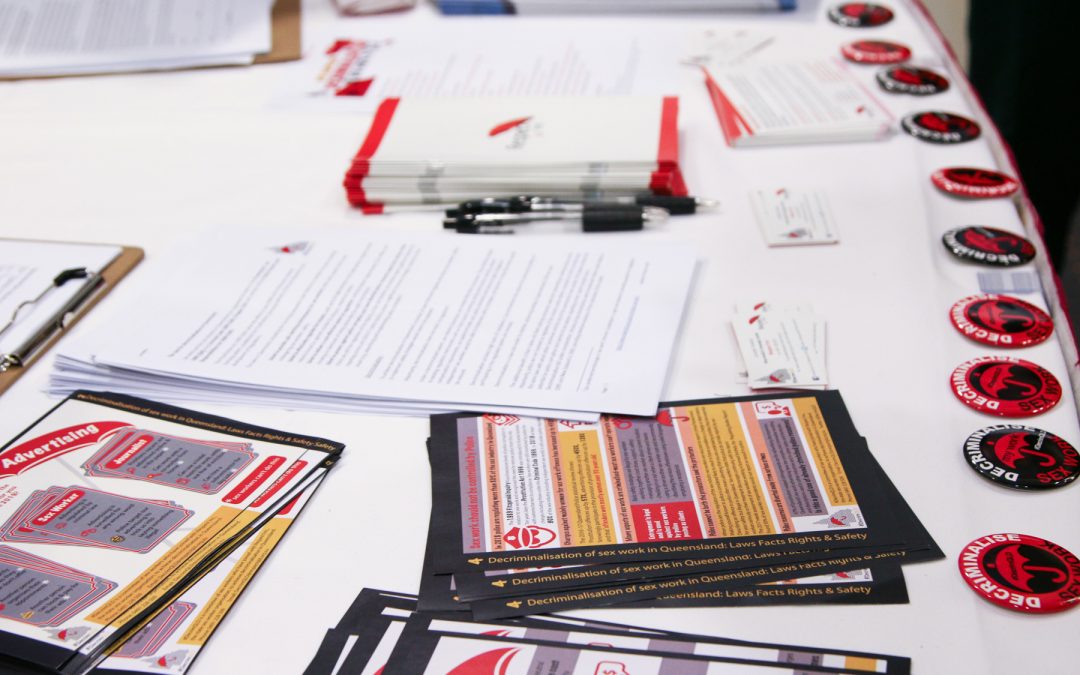DecrimQLD, Respect Inc and Scarlet Alliance welcome the announcement last night by the Attorney-General Hon. Shannon Fentiman that the Queensland Government will decriminalise sex work in Queensland. The announcement follows an independent review by the Queensland Law Reform Commission and provision of the report and 47 recommendations to the Attorney-General on 31 March.
We look forward to the release of the Queensland Law Reform Commission (QLRC) report. The consultation paper resulted in many submissions from sex worker organisations and individual sex workers in Queensland outlining their lived experiences and the impact of the current licensing framework. The QLRC was tasked with recommending a framework for a decriminalised sex work industry in Queensland by the Attorney General in August, 2021.
Sex work is work and laws that criminalise sex work workplaces and our safety strategies diminish our ability to work safely or legally. While decriminalisation will be a life changing policy shift for sex workers and our families because we will no longer be criminalised, the rest of Queensland thinks it has already happened and will probably not even notice it has changed.
The purpose of this framework was to remove barriers to workplace health and safety and legal protections for sex workers, while having regard to both the experiences of Queensland sex workers and the views of the Queensland community.
The Prostistution Act enables the 20 licensed brothels but criminalises all other sex work workplaces. The Criminal Code criminalises sex worker safety strategies and the Police Powers and Responsibilities Act allows for police to deceive sex workers by posing as our clients and entrapping us for actions that are about working safely.
Decriminalisation is the repeal of sex work and sex industry specific criminal laws. It is not ‘de-regulation’ as once these criminal laws are repealed the existing laws and regulations that apply to all businesses will apply to the sex industry. WHS is a good example, the WHS regulator currently has no role in relation to sex industry workplaces and sex workers want WHS guidelines that apply to every workplace.
The announcement brings Queensland in line with domestic and international best practice. Decriminalisation is a cost effective, high compliance model for government and supports workplace health, safety and rights for sex workers.
Queensland will follow states and territories that have already decriminalised sex work in those jurisdictions.
Key statistics on sex work in Queensland:
In 23 years, the licensing framework has resulted in only 20 licensed brothels and has criminalised all other sex industry business models and shared workplaces. As a result, police regulate 90% of the sex industry. This 90% of sex workers and our workplaces are criminalised and at risk of QPS raids, entrapment & charges for implementing basic safety strategies.
In a recent study of 204 sex workers in Queensland:
- 76.5% of sex workers said they would not make a police report under the current laws
- 89% of sex workers reported that it was difficult to comply with the laws
- 96% of sex workers said that they would like more options for workplaces than licensed brothels or working alone
- 96.7% of sex workers did not support police being allowed to pose as clients
- 94.1% of sex workers rated decriminalisation as ‘very important’ to them
- 72.5% of sex workers experienced discrimination
- 91% of sex workers who had experienced discrimination did not report it.
- 57.8% of sex workers did not feel comfortable disclosing to healthcare providers that they are a sex worker
49% of survey respondents (100/204) said they had either personally been charged or fined by the police, or had a friend or (sex working) co-worker who had been charged or fined.
Most indicated they had experienced multiple charges or fines.
57 respondents experienced police entrapment but had not been charged.
17 respondents had been charged or fined for something else including helping another sex worker with their advertisement, working with a third party or working in a hotel/motel room booked by someone else.
The most common reasons sex workers were charged or fined were:
- advertising 43%
- working in pairs 40%
- working from the same hotel as another sex worker 29%
- providing illegal services 23%
- having a receptionist, driver or other support staff 21%
- providing sexual services at a massage parlour 18%
- tainted property 16% (phone and earnings are seized as the proceeds of an unlawful act)





